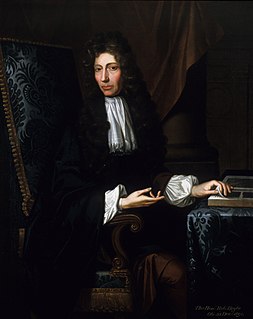A Quote by Owen Feltham
Riches, though they may reward virtues, yet they cannot cause them; he is much more noble who deserves a benefit than he who bestows one.
Related Quotes
No profession or occupation is more pleasing than the military; a profession or exercise both noble in execution (for the strongest, most generous and proudest of all virtues is true valor) and noble in its cause. No utility either more just or universal than the protection of the repose or defense of the greatness of one's country. The company and daily conversation of so many noble, young and active men cannot but be well-pleasing to you.
If the Lord should give you power to raise the dead, He would give much less than He does when he bestows suffering. By miracles you would make yourself debtor to Him, while by suffering He may become debtor to you. And even if sufferings had no other reward than being able to bear something for that God who loves you, is not this a great reward and a sufficient remuneration? Whoever loves, understands what I say.
Riches are oft by guilt and baseness earn'd;
Or dealt by chance to shield a lucky knave,
Or throw a cruel sunshine on a fool.
But for one end, one much-neglected use,
Are riches worth your care; (for nature's wants
Are few, and without opulence supplied;)
This noble end is, to produce the soul;
To show the virtues in their fairest light;
To make humanity the minister
Of bounteous Providence; and teach the breast
The generous luxury the gods enjoy.
There was about all the Romans a heroic tone peculiar to ancient life. Their virtues were great and noble, and these virtues madethem great and noble. They possessed a natural majesty that was not put on and taken off at pleasure, as was that of certain eastern monarchs when they put on or took off their garments of Tyrian dye. It is hoped that this is not wholly lost from the world, although the sense of earthly vanity inculcated by Christianity may have swallowed it up in humility.
It is certain that despotism ruins individuals by preventing them from producing wealth much more than by depriving them of what they have already produced; it dries up the source of riches, while it usually respects acquired property. Freedom, on the contrary, produces far more goods than it destroys; and the nations which are favored by free institutions invariably find that their resources increase even more rapidly than their taxes.
Manners or etiquette ('accessibility, affability, politeness, refinement, propriety, courtesy, and ingratiating and captivating behavior') call for no large measure of moral determination and cannot, therefore, be reckoned as virtues. Even though manners are no virtues, they are a means of developing virtue.... The more we refine the crude elements in our nature, the more we improve our humanity and the more capable it grows of feeling the driving force of virtuous principles.
Daughter to that good Earl, once President Of England's Council, and her Treasury, Who lived in both, unstained with gold or fee, And left them both, more in himself content, Till sad the breaking of that Parliament Broke him, as that dishonest victory At Chaeronea, fatal to liberty, Killed with report that old man eloquent. Though later born than to have known the days Wherein your father flourished, yet by you, Madam, methinks I see him living yet; So well your words his noble virtues praise, That all both judge you to relate them true, And to possess them, honoured Margaret.
War both needs and generates certain virtues; not the highest, but what may be called the preliminary virtues, as valor, veracity, the spirit of obedience, the habit of discipline. Any of these, and of others like them, when possessed by a nation, and no matter how generated, will give them a military advantage, and make them more likely to stay in the race of nations.


































